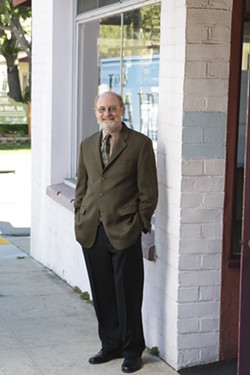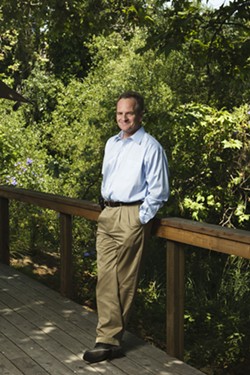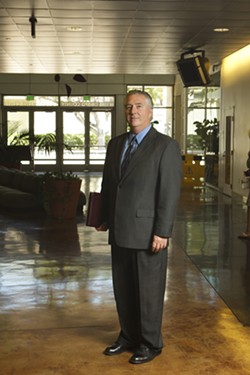Here we go again
California's 15th District will soon--finally!--get a new senator to call its own
By Ryan Miller and Shelly Cone[{
"name": "Ad - Medium Rectangle CC01 - 300x250",
"id": "AdMediumRectangleCC01300x250",
"class": "inlineCenter",
"insertPoint": "8",
"component": "2963441",
"requiredCountToDisplay": "12"
},{
"name": "Ad - Medium Rectangle LC01 - 300x250",
"id": "AdMediumRectangleCC01300x250",
"class": "inlineCenter",
"insertPoint": "18",
"component": "2963441",
"requiredCountToDisplay": "22"
},{
"name": "Ad - Medium Rectangle LC09 - 300x250",
"id": "AdMediumRectangleLC09300x250",
"class": "inlineCenter",
"insertPoint": "28",
"component": "3252660",
"requiredCountToDisplay": "32"
}]
On July 1, Secretary of State Debra Bowen hereunto set her hand and affixed the Great Seal of California to yet another official election document. This time, she was making her mark on a certified list of candidates for the Aug. 17 special general election for the state’s 15th Senate District, vacated by now-Lt. Gov. Abel Maldonado.
Republican and current Assemblyman Sam Blakeslee, Democrat and former Assemblyman John Laird, independent candidate and retired UPS account manager Jim Fitzgerald, and Libertarian and retired engineering manager Mark Hinkle are vying for the seat. Again. They first faced off in a June 22 special primary election, each appearing as the sole candidate for his party or designation. Since none of them won 50 percent of the vote plus one, they’re continuing the battle to represent constituents in Santa Barbara, San Luis Obispo, Monterey, Santa Clara, and Santa Cruz counties—about 846,791 people in total.
Blakeslee swayed the most voters in the June 22 primary, finishing with 49.40 percent of the vote, and said his message hasn’t changed. He’s still making the same arguments he brought up at the beginning of the race.
“Our campaign has been laser focused on the real problems California faces,” he said.
He highlighted bringing evaporating jobs back to the state, budget reform, government reform, and stopping “the kind of nonsense that happens every year up in Sacramento.”
Blakeslee was “enthused and excited” about his lead in the June election, which he said confirms the belief he’s held since he started: that a moderate Republican would be highly competitive in the district, which he sees as very similar to the assembly district he’s represented for six years.
A former scientist, Blakeslee has run in half a dozen elections since starting his political endeavors, from chamber board in 1996 to his senatorial aspirations of today.
“Every other race I’ve been involved in … it felt very local,” he said. “This is the first race I’ve been in with statewide and even national tension.”
At stake, he explained, is the possibility that the Democrats could seize a supermajority control of the senate. A Laird win would tip the scales that much closer to the party’s ability to pass taxes without bipartisan negotiations, to pass the budget on its own, to override gubernatorial vetoes on bills.
“That has really raised the bar and raised the [stakes] of the outcome of this election,” he said.
This whole election season, in fact, has prompted him to set his sights higher than ever before.
“I guess I am struck with the magnitude of the challenge facing Sacramento and California—California in particular,” he said. “I run for office because I believe in service. I believe our job as we stand up to represent the people is to make decisions that solve problems. What I’m really focused on is how we’re going to fix California.”
And with a state teetering on the brink of calamity, Blakeslee said commonsense reform—of the sort he claimed Laird obstructed throughout his tenure—is a critical challenge. Blakeslee supports a spending cap and a rainy day reserve fund, the latter of which could be used to “fund schools and critical health care needs during the bad times.”
“My task is to challenge my colleagues to join me,” he said.
For his part, Laird—who took 41.81 percent of the primary vote—also sees crisis at hand.
“Right now,” he said on July 16, “the budget is 15 days late, and my opponent is a Sacramento insider, and there’s no statement about what he would do to fix what is the biggest crisis in modern times, and that’s just crazy.”
“I think a debate about debates is probably the least constructive exercise,” Blakeslee told the Sun, noting his campaign has accepted three dates for debates thus far.
“We’d rather talk about the issues,” he said.
Laird explained that he’s faced a challenge in trying to focus people on important issues, but nobody will talk about them. He highlighted the fate of K-12 education, which he said hangs in the balance in the current budget, and lamented that the middle class is on the verge of getting priced out of higher education in the state. He also touted funding the state parks system, which he said anchors the visitor-serving industry and economically benefits the Central Coast, and promoting green jobs and industry.
Blakeslee talked about green technology, too, especially as it pertains to the northern tech-oriented stretch of the district, but Laird dismissed any such talk from him.
“My opponent says he’s the best Republican on the environment,” Laird said. “That’s like saying you’re the handsomest frog in the pond. You know, that’s a low threshold.”
Laird emphasized that he worked hard to connect with the public when he was in office, coordinating scores of meetings with boards, councils, and other groups when he was out of session.
“And I think that’s what’s been missing on the Central Coast,” he said, “that level of effort to reach out and make sure the people are heard. It’s difficult, but if you’re a good elected official, you don’t duck that.”
In that regard, Laird explained that he knows what issues he’d work on as senator, but admitted he actually doesn’t totally know where he’d focus his attention. He’d leave that up to his constituents.
Fitzgerald, who took 5.89 percent of the June vote, has spent a lot of time in the election office. As an independent (not affiliated with any party) candidate, he has to turn in signatures to get his name on a ballot. It’s a difficult endeavor, he said, but he’s soldiered on—at least until now. Since Proposition 14 passed, he explained, third-party candidate names will be few and far between on general election ballots.
“The top two vote getters in most cases will be Republican or Democrat,” he predicted.
For now, however, he’s pressing forward on the path to Sacramento, armed with arguments for mandatory limits on campaign spending, against offshore drilling, and for a four-day work week for the legislature with a goal of balancing the budget. He aims to help keep businesses from hemorrhaging out of the state and eliminate wasteful governmental spending, in part by offering incentives to departments that don’t spend their entire budget.
Fitzgerald is no stranger to campaigning for this seat. He was the sole opposition against Maldonado’s 15th Senate District bid in 2008.
“When I was running against him, I said he was not going to stay in this office for four years,” Fitzgerald said. “It was his pattern. He was always running for something else.”
In that election, Fitzgerald poured funds into radio and TV ads, as well as—he’s sorry to say—robo-calls. This time, however, he decided to run a grassroots, straightforward campaign, and he’s excited about being the only candidate to have an official statement mailed out to voters. He’s hoping his statement will, in turn, direct potential constituents to his website.
He said he was counting on nobody getting the necessary percentages to win in the special primary, and was surprised Blakeslee got so many votes. Still, he budgeted his campaign through August and is hoping for greater turnout in the general, since it’s more removed from the string of other elections earlier this summer.
“I think there actually is a chance I could win,” he said. “I’m hoping that this is the election they won’t vote the party, but will vote the message.”
“Message” is the impetus behind Hinkle’s run. The chair of the National Libertarian Party admitted he’s not financially committed to a hard push (“Frankly, I’m not going to put a serious amount of money in this campaign.”), but is using his foot in the race to kick up important topics.
And talk issues he does: He’s for legalizing marijuana, reducing the government to a 10th of its current size, dismantling the IRS (“Imagine how sweet life would be if we didn’t have to fill out those forms every April 15th), more privatization, a return of the bracero program, and more. He’s puzzled by elected officials (“I can’t think of a group less qualified to run the economy than our state legislature.”) and the people who repeatedly put them in office (“Are the voters insane? I’m assuming they’re not.”).
And as flippant as he seems to be about his third-party status, he’s excited about the rise of decline-to-state voters and what he sees as a growing sentiment in the state to eschew Republican or Democrat labels.
Like Fitzgerald, he sees the changes wrought by Proposition 14 as political death to folks like him.
“If we don’t get it overturned by the courts, you can pretty much kiss all third parties goodbye in California,” he said.
He cited precedence for such extinction in Washington and Louisiana, claiming it’s basically a guarantee for incumbents to be re-elected. So what else can we do? Another of Hinkle’s proposed reforms is instant run-off voting. Voters rank candidates by preference, and if their first choices don’t yield a clear winner, vote-counters work their way down the lists until someone tallies enough points for that coveted 50 percent plus one.
Hinkle calls the approach good for both candidates and taxpayers in that one election saves time and money for everyone, eliminates “wasted” third-party votes, and sends a message to incumbents that they need to pay more attention to issues.
An instant run-off vote would have spared voters the headaches of this current special election cycle, which Hinkle described as a “monumental waste of taxpayers’ money.”
On that note, none of the 15th Senate District’s five counties was financially prepared for this oddity of a race. The estimated combined cost of the two special elections is more than $6 million for the district. And invoices are still coming in, so that total may change, various county officials said. The extra dollars and necessary manpower have counties digging into their general funds to find cash to cover the expenses.
Elma Rosas, media/elections coordinator for Santa Clara County, said the cost estimate for her county is $1.4 million for the June election and $1.2 million for the August election.
While they were unprepared for the first of the two special elections, notice of the second one came in time for budget planning.
“Obviously, June 22 we didn’t know about, so we have to go back and get funding for that,” Rosas said. “But August, we kind of knew, and it’s the new budget year, so we were able to fund for that.”
Santa Barbara County wasn’t able to budget for either election, said Billie Alvarez, chief deputy registrar of voters. She explained that the county estimates the cost of the elections to be $530,000 each.
“There’s no indication it will be reimbursed [from the state] either,” Alvarez said. “Either way—if we had or hadn’t budgeted for it—it was an unfunded election, and we’d have to foot the bill.”
Monterey County will also feel the pinch as it tries to cover the combined estimated $1.2 million required for the two elections. Linda Tulett, county clerk, echoed sentiments repeated around the district: They weren’t prepared for the special elections and didn’t budget for them. She talked about the financial impact the elections will have on the county, but also elaborated on the impact it will have on voters.
In Santa Cruz County, the elections office is preparing for a small Aug. 10 landowner election, gearing up for the November election, and facing August’s June rerun. Gail Pellerin, registrar of voters, praised her crew for successfully conducting the June 22 election despite the inconvenience and a big voter turnout, but she isn’t happy about having to do it again, especially in the midst of all their regular duties.
Pellerin said her county’s costs were estimated at $300,000 for each election. Costs for June’s election are still coming in, however. So where’s the money to cover all this coming from?
“There’s no money,” she said. “The county has to take money from other vital county programs to fund this.”
Shelling out for special election expenses when counties have already been hit hard by the economy doesn’t sit well with Pellerin. She said her department already has limited space, limited voting equipment, and limited people who will have to get ready for this repeat election.
“We were outraged,” Pellerin said. “At the very beginning, we tried to convince the governor to consolidate. It’s frustrating that he didn’t heed any of the requests to consolidate.
“It’s also a bitter pill because the Aug. 17 election is an exact repeat of the June 22 election,” she added. “The only thing that changed is the name on the top of the ballot.”
But the governor’s office said Gov. Arnold Schwarzenegger did consider the elections’ financial impacts when he announced Maldonado as his vote for lieutenant governor. Aaron McLear, press secretary to the governor, blamed the current situation on partisan politics.
“We wanted to consolidate the June primary. The Democrats in the legislature deliberately stalled confirmation just long enough to miss the deadline to consolidate with the June primary,” McLear said. “It was literally, like, the day after the deadline passed that they confirmed him.”
Blakeslee echoed that take on the situation.
“I think we’re all very frustrated by what occurred,” he said. “If Abel had been confirmed any time between the November and April timeframe, this would have been consolidated with the June 8 election. It would be over.
“The highly partisan speaker in the Assembly decided to play politics with this, and the governor felt there was a very real possibility the budget would not pass if there were not enough senators.”
Laird put a different theory on the table: “The reason the governor called it was to have low participation, because they thought they likely could not win a November election with regular turnout.”
He painted the special election as a political ploy as well, and worried about its timing coupled with voter-suppressing negative ads.
“This is not a conventional election where you try to persuade people to issues,” he explained. “This is one to actually try to motivate people to vote and that there’s something at stake. There is election fatigue, and yet there’s a lot at stake in this election.”
When it came time for a vote, he said, once it was apparent the Republicans and Democrats were each only running one candidate, the primary election should have been scrapped.
“I’m really upset with both parties,” he said.
Blakeslee said he asked Gov. Schwarzenegger to consider the impacts of a special election, but was told the risk of a budget tangle due to too few senators was too dangerous to ignore. Considering Sen. Dave Cox’s recent death, and another senator’s ongoing illness, Blakeslee said he thinks the state will now be buzzing over how to fill the 15th Senate District seat as quickly as possible.
Plus, he said, the governor assured him there would be a forthcoming bill to reimburse the counties.
But critics point out that intentions don’t pay the bills. County officials said they’re still waiting on money the governor said would be coming to reimburse them for the May 2009 special election, so even a promise of funds to come is small comfort at best.
“When he says the check is in the mail, it could be years,” Santa Cruz County’s Pellerin said.
Ryan Miller is executive editor of New Times and the Santa Maria Sun; Shelly Cone is arts editor at the Santa Maria Sun. Send comments to [email protected].
Latest in News
Readers also liked…
-

Coast Unified teachers upset over new position's salary and qualifications
Oct 20, 2022 -

SLO police identify alleged driver who hit and killed couple
Dec 22, 2022 -

When the levee breaks: Oceano residents, county officials walk a tightrope of regulations to manage Arroyo Grande Creek, which some say led to the levee's failure in January
May 18, 2023















